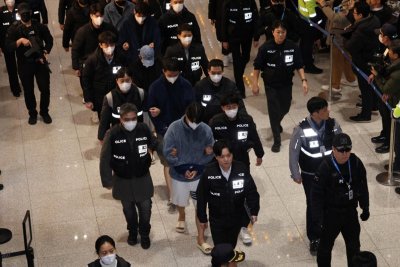73 Koreans repatriated from Cambodia in $33.6 million scam probe

South Korean suspects accused of operating a massive scam ring in Cambodia arrive at Incheon International Airport following their forced repatriation in Incheon, South Korea, 23 January 2026. According to the South Korean National Police Agency and the Blue House, 73 nationals were extradited via a chartered flight in the largest-ever single repatriation of criminal suspects to the country. The suspects allegedly defrauded 869 victims of approximately 48.6 billion won (33 million US dollars) through romance scams, fraudulent investment schemes, and voice phishing. Photo by HAN MYUNG-GU / EPA
Jan. 23 (Asia Today) — South Korean police took 73 nationals into custody Friday after they were forcibly repatriated from Cambodia on a chartered flight over alleged involvement in large-scale online scams and other crimes.
Korean Air flight KE9690 departed Phnom Penh and landed at Incheon International Airport at about 9:41 a.m., according to officials. It was South Korea’s fourth group repatriation of criminal suspects by charter flight and the largest return from a single country.
Authorities said arrest warrants had already been issued and were executed as the suspects boarded the aircraft. Under South Korea’s Nationality Act, the interior of a national carrier is treated as Korean territory for legal purposes, allowing warrants to be served during the flight process.
The suspects were then escorted from the airport to police units in multiple jurisdictions for questioning and further investigation.
Investigators allege the group defrauded about 869 South Korean victims of roughly 48.6 billion won ($33.6 million). Seventy suspects face fraud-related allegations, including romance scams and investment chat room schemes, while three are accused of other crimes including robbery and illegal gambling, officials said.
Among those repatriated was a couple accused of running a romance scam operation that used deepfake technology to pose as fictitious personas, allegedly taking about 12 billion won ($8.3 million) from 104 victims. Authorities said the pair attempted to evade capture, including by altering their appearance, and were not included in a previous repatriation in October.
Officials also cited a suspect accused of posing as an investment expert and allegedly taking about 19.4 billion won ($13.4 million), with victims including recent graduates and retirees.
Authorities said suspects were apprehended in multiple Cambodian locations and that seven scam compounds were identified. South Korean officials also said some victims, including men in their 20s who were allegedly confined and abused at the sites, were rescued.
— Reported by Asia Today; translated by UPI
© Asia Today. Unauthorized reproduction or redistribution prohibited.
